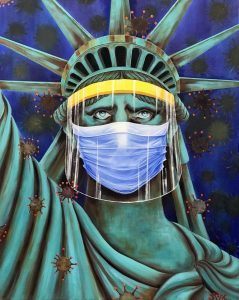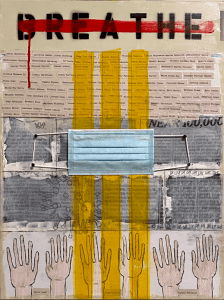U.N.’s World Day of Social Justice resonates with Ph.D. students through Penumbra, Union’s journal of critical and creative inquiry
The United Nations sets aside February 20 annually to observe an international day of Social Justice. Students in Union’s Ph.D. program in Interdisciplinary Studies examine social justice within a context of academic excellence every day of the year.
One vehicle Union has created to examine and further social justice is Penumbra, the official, refereed, scholarly journal of the Ph.D. program. It is a joint project between students and faculty, giving students the opportunity to promote their scholarship and to experience publishing that scholarship.
Created by and for Union students in 2012, Penumbra now features seven issues. The publication’s content is designed to disrupt and challenge injustice through interdisciplinary studies and critical scholarship. Penumbra is managed by Union Ph.D. students, who, in turn, are advised by Union faculty.

Fearless painted by Ph.D. alumnus Raul Manzano depicts the resilience of the brave ones to overcome threats, suffering, and adversity to defend and preserve the race’s survival and evolution. Click the image to read more about this painting and artist.
Current editor Kristen N. McNutt explains the significance of the journal: “Penumbra’s purpose is to promote theoretically informed engagements with concrete issues and problems through critical scholarship. The journal publishes socially engaged, innovative, creative and critical scholarship with a focus on ethical and political issues in the four concentrations of the Ph.D. program. (Educational Studies, Ethical & Creative Leadership, Humanities & Culture, and Public Policy & Social Change). With Union’s interdisciplinary focus, we are able to look at the vast perspectives of social issues and seek to address injustice through scholarship, which is embraced by Penumbra. Penumbra supports students to develop their voices as social justice scholars and provides an opportunity to push the boundaries of scholarship to support social change. This can be rare in academia and publishing.”
In addition, the process of getting published can be daunting, with few opportunities for students.
“Penumbra offers a safe space for the newer scholar to gain experiences in the publishing process as a whole. It’s an opportunity to develop a voice as a scholar without judgment,” said McNutt. “Most importantly, students at Union have the opportunity to participate in the full publishing process. Not only are students encouraged to submit papers or creative works from their courses or dissertation, but students at Union also have the opportunity to participate in all the facets of the publishing process.”
Each year students are encouraged to apply to serve on the editorial team, with calls of positions sent out each year. Additionally, students can serve as peer reviewers alongside faculty. Submissions are judged through a double-blind peer-review process by a faculty and student reviewer.
Another area of focus is learning how to publish.
“Publishing a scholarly article can be confusing and frightening. Submission criteria often requires the student to adapt their research to the requirements of the journal. The process for submissions will vary from journal to journal, so this is a real-world chance to learn,” said McNutt. In academia, there is an expectation to publish.
Karsten H. Piep, Ph.D. doctoral faculty and current chair of the journal’s faculty advisors, offers this view: “While not a prerequisite to obtaining the Ph.D. degree, the publication of one or two articles in peer-reviewed journals such as Penumbra gives doctoral students a head-start in establishing themselves as scholars within their fields. An excellent dissertation will no doubt open many doors inside and outside of academia. But, in an increasingly competitive academic job market, doctoral students and recent graduates with a record of conference presentations and peer-reviewed publications will have a clear advantage. And those who are not pursuing academic careers should also consider publishing their research in peer-reviewed journals, for this remains the most effective way to engage with the wider scholarly community.”
The current issue, Enough, was published in August 2020.
McNutt expands on the current issue: “This seventh volume of Penumbra emerged at the intersection of the 2020 presidential elections, the global pandemic, and the racial justice protests and reckoning after the death of George Floyd in Minneapolis. Both the pandemic and the protests drew attention to ongoing and systemic racial, class, and gender disparities in the United States and around the world.”
The issue tells a story of the complexity of achieving social justice. The articles, poetry, and visual arts contributed by the authors and artists shed light on the contested spaces to bring social justice issues out of the shadows through an interdisciplinary lens. Using poetry as a medium, Tammy Nuzzo-Morgan calls into question the white picket fence of the American Dream. In her poem, Light ’em Up America, Nuzzo-Morgan asks, “Who the hell were Ozzie and Harriet anyhow, right?” Through the autobiographical narrative of Ta-Nehisi Coates’s Between the World and Me (2015), Chinelo Ezenwa utilizes close reading to deconstruct the black experience of the American Dream. Larry Ellis, in “In Search of My Mother’s Garden”, examines the intersection of race and gender by discovering the creativity of his mother and grandmother’s gardens. By deconstructing Beyoncé Knowles’s music video and Super Bowl performance of “Formation,” Nena Carpenter explores the singer’s emancipatory artistry that she brought into the living rooms of America. In her conceptual essay, “One Heroine’s Journey through the Dissertation,” Angela Kraemer-Holland explores her challenges and resilience in completing her doctoral dissertation. Taking a social science turn, Kei Graves traces the exploitation of adjunct faculty. Tamara White’s “Flying by the seat of my pants,” asks viewers to examine the complexities of social justice implications of living with diabetes. On a different note, Sherri Moyer, in her poem, “Within My Lane”, wrestles with family and social norms that can keep people silent to injustices.
Woven within all the pieces included in this volume is a call to end racial, social, gender, and economic injustice. However, for change to occur, we cannot be afraid to move from our comfort zones and say, “ENOUGH.”

No Breath was painted by Ph.D. alumna Tamara White. Tamara focuses her visual pieces on the intersection of art, social justice, and health equities. Click on the image to read more about the interpretation of this visual piece.
A special section, “The Politics of Breath: Pandemic to Protest,” was also published in 2020 to better illustrate how issues can intersect within oppression so differently within daily lives. “This volume tells a story of the complexity of achieving social justice. The articles, poetry, and visual arts contributed by Union authors and artists shed light on the contested spaces to bring social justice issues out of the shadows through an interdisciplinary lens,” said McNutt
While typically published annually, students in the MLK Studies Specialization asked to develop a special edition to be published later this year. Ph.D. students Bryon Garner and AC Panella are co-editors.
“This special issue grew out of some of the important activist work that our MLK studies produce. Our hope is to do a special issue each year highlighting a different element of the Ph.D. program,” said Panella. “I believe that one of the elements that makes Union unique is that we take an interdisciplinary approach not just to academics but also to bringing scholarship into and with social justice movements. This special issue will highlight how activism and academics are both ways of supporting social change.”
Submissions are invited from a variety of genres – including creative nonfiction, fiction, poetry, and visual works that address any aspect of the journal’s mission and scope. Submissions will be accepted from Union alumni, graduate students, junior scholars and university programs – including programs in Africa, where Union has recently worked to develop Ph.D. programs. Critical and creative voices who are established in their fields are also invited to submit.
Learn more about Penumbra.
About Kristen N. McNutt
Kristen N. McNutt is a scholar-practitioner completing a Ph.D. in Interdisciplinary Studies with a concentration in Public Policy and Social Change at Union Institute & University. She holds a Master of Nonprofit Management from Regis University. Kristen has studied women and gender studies at the undergraduate and graduate levels, earning a Bachelor of Science at Northern Arizona University and a Master of Arts at the University of Northern Iowa. Her research is in decolonial and feminist theories, epistemologies, and methodologies with a focus on gender policy and postconflict reconstruction. Her dissertation research will focus on a comparative analysis of Ministries of Gender/Women and gender mainstreaming in postconflict state-building in Africa.
Union is a global leader in providing higher education degrees for the adult learner. Your Goals. Your Success. Your Union. We’ve Got U!
Visit myunion.edu to learn more.